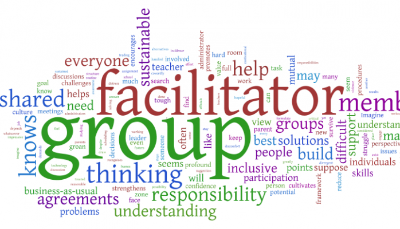December 2012 - The FoCuSeD™ Facilitator eNewsletter

Consultant versus Facilitator Role? | Gary Rush Facilitation
Confusion exists amongst clients regarding when to hire a “Facilitator” versus when to hire a “Consultant”.
When a client wants to hire me, I ask a lot of questions to determine what role the client really needs. Clarifying the role at the outset helps educate the client as well as helps glean what is expected of me so that I fill the appropriate role or guide the client to the right person who can.
In addition, clients often make the mistake that they need to hire a Facilitator with background in their business – as they would a Consultant. I address this to help them understand that a Facilitator does not need to know the business. A Facilitator needs to know how to facilitate.
We need to help educate the clients on the roles because when a client hires the right person, expectations can be met. To help, I use the following definitions:
- A Facilitator is a content neutral guide enabling a group of people to come together and accomplish a task.
- A Consultant is a professional who provides advice in a particular area of expertise (from Wikipedia).
A significant difference is that a Facilitator is a content neutral guide (Facilitators manage process) and a Consultant provides advice (advice about the business content). So, when is each appropriate?
Identify the Need
The overriding question that a client must answer is, “What is my need?” If the need revolves around the content of the business, the client needs a Consultant. If the need revolves around getting groups to accomplish a task or the process to make that happen, the client needs a Facilitator. To answer the overriding question, ask the following:
- What problem are you looking to solve?
- What do you expect from me?
- How will we work together?
If the client answers the questions with, “We need help developing our plan,” “We want you to help us stay on track to accomplish our plan,” and “You define the process for us”, business knowledge exists (as it generally does), and the client needs a Facilitator.
If the client answers the questions with, “We don’t know what the competition is doing,” “We need you to tell us about trends or what others are doing,” and “We are looking to you for industry knowledge”, business knowledge is needed (as occasionally is the case), and the client needs a Consultant.
So …
| If the need is to: |
Hire a: |
|
Advise on business subject matter, etc. |
Consultant |
|
Research on trends, competition, etc. |
Consultant |
|
Help with a particular area of expertise (programming, etc.) |
Consultant |
|
Guide a group to accomplish a defined task, e.g., strategic planning, data modeling, requirements gathering, design, problem-solving, etc. |
Facilitator |
|
Enable a group of people to change their behavior or to do team building. |
Facilitator |
|
Make a decision or develop a product (a Consultant, as a participant, may contribute content). |
Facilitator |
Summary
Educate the client:
- Define the real need – clarifying the role at the outset helps educate the client.
- Ask questions and clearly define what skill meets the need most effectively.
- Ensure that the client understands the role of the Facilitator versus the Consultant.
- A Facilitator enables a group of people to come together and accomplish a task. A Facilitator does not need to know the business. A Facilitator needs to know how to facilitate.
- A Consultant provides advice or skills about a particular area of expertise. A Consultant needs to know the business.
When you do that, the right skill set will be used and the client will be happier. ![]()
Footnote: Because clients already know their business, they need Facilitators more often than they need Consultants. In preparation, a Facilitator will pick up enough of the business jargon to effectively facilitate any business. (Consultants provide more value when they are trained Facilitators, because they provide advice when needed, use facilitative skills to bring out the knowledge from within the client, and can switch roles to become a Facilitator - that provides more value-added service to the client.) Note: Clients should check to see if the Facilitator is an IAF Certified™ Professional Facilitator (CPF) to ensure their expectations are met.

